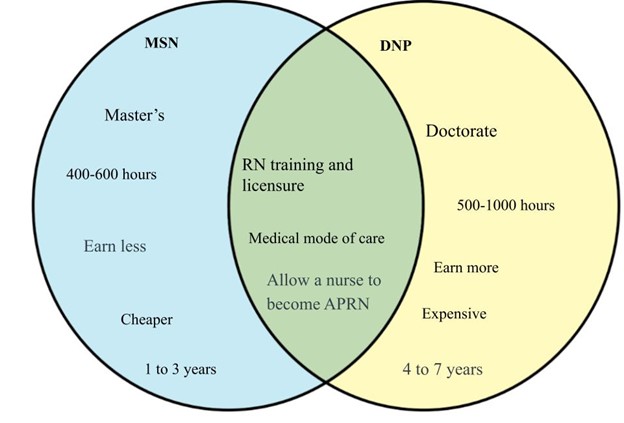Difference between MSN and DNP
The first significant difference is in their focus. MSN degrees prioritize medical skills, including administration of anesthesia, support for those with various mental diseases and preparation, among others. DNP incorporates medical skills training with an additional focus on statistical analysis, leadership, and employee management. MSN and DNP are two different levels of graduate degrees even though both are degrees for nursing and both prepare registered nurses for clinical sciences, administration research, or nursing education. However, DNP programs contain additional training in systems leadership, health care policy, inter-professional collaboration, evidence-based practice, and health information systems. Due to this additional training, the required level for registered nurses has moved higher from MSN to DNP.
MSN[edit]
Master of Science in Nursing (MSN) is a post-graduate degree that is majorly for an advanced level of registered nurses. It is considered an entry-level for nurse educators and managers. It also helps them seek a career as a nurse but in the higher levels of it. Because of their level of training, MSN nurses are expected to guide aspiring nurses and healthcare staff. They are expected to ensure that patients receive the best possible treatment in a conducive environment. It is important for MSN registered nurses to cover leadership and administrative roles to BSC registered nurses.
DNP[edit]
The DNP is a degree that is structured for the preparation of individuals for specialized nursing practices. The practicing nurses at the DNP level abilities and competence is expressed through The Essentials of Doctoral Education for Advanced Nursing Practice. For the transformation and improvement of health care, it is essential to know the role and importance of patient care technology and IT.
| MSN | DNP | |
|---|---|---|
| Minimum Eligibility Requirements | RN training and license. | RN training and license. |
| Degree level earned | Masters | Doctorate (PhD) |
| Clinical hours | 400 to 600 hours | 500 to 1000 hours |
| Similarities | Allows a nurse to become an advanced practice registered nurse (APRN). | As well, a nurse becomes an APRN by studying this program. |
| Earnings | Usually earn less than a DNP. | On the other hand, DNPs usually earn more money. |
| Cost of education | Cheaper | Expensive |
| Duration of the program | 1 – 3 years | 4 – 7 years |

